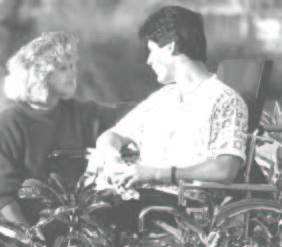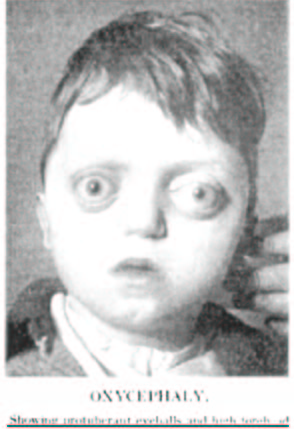THE REAUTHORIZATION OF PRACTICALLY EVERYTHING
What we’ve got now?
Ain’t working.
by Lucy Gwin
![]() he real is a long way from the ideal, and even
the ideal doesn’t look so terrific right about now.
he real is a long way from the ideal, and even
the ideal doesn’t look so terrific right about now.
In this issue, and some others, I’ve used photos from medical textbooks of the eugenics era. They speak to me of the real and of the ideal. I hope that you too can hear them calling our names.
The boy on our cover, seen in context here, lived and died on the receiving end of the best help his era could offer. No doubt he overheard some grand hype about “progress in the field.” Today he is surprised to see that state institutions like the one he knew are largely unchanged. He sees today’s community agencies, founded to revolutionize the helping industry, operating similarly, delivering diagnosis and segregation. The terms he uses, though, are dis-labeling and dumping.
This is the year when the 1973 Rehabilitation Act must be reauthorized by Congress. Look at that word, authorization. Clearly, our governments have authorized (invested society’s authority in) the wrong ideas, put its helping in the wrong hands.

THE IDEAL

THE REAL
Rehab act reauthorization comes up every three years. That’s the occasion to scrutinize reality, bring practices into line with ideals, invest our authority more wisely. The helping industry meets no such scrutiny.
How can we authorize a new ideal? We can gather together and hash it out. So let’s do this: small groups can gather here and there, now and again, on our own authority, to reauthorize helping as it is dispensed to people with disabilities and their families. (Other noble ideas have been dislabeled and need some scrutiny too. Integration, for instance.)
![]() eauthorization can mean, and I hope it will mean,
reinvention. What we’ve got now? Ain’t working.
eauthorization can mean, and I hope it will mean,
reinvention. What we’ve got now? Ain’t working.
My friend Kathleen Kleinmann tells me she reinvents her independent living center every year or so, to keep its actions in line with its own and its customers’ standards, and also with what they meet head on when they try to make things work. Reinventing help won’t be as easy as that (not that what she does is easy) and none of us can expect that the job will ever be done. But we must begin. Here’s a jumping-off idea to get us talking:
John McKnight (Careless Society) looks at communities and has discovered that as they grow richer in social [special] services, they grow poorer in competence and solidarity. Do you hear that?
Gathering up, giving ourselves authority to rein-vent the help we give and get, we can begin to retake those riches. And, hey: when you gather, keep the Mouth posted on how it goes and what you reinvent, together.
MARCH -APRIL 2002 MOUTH PAGE 23